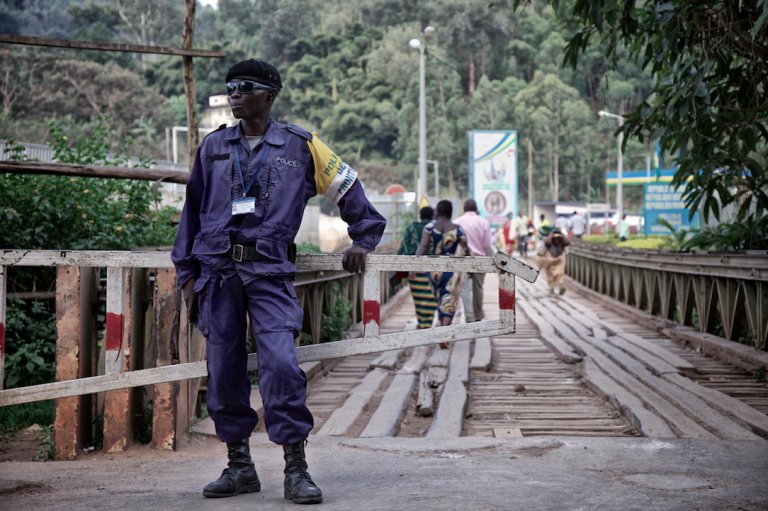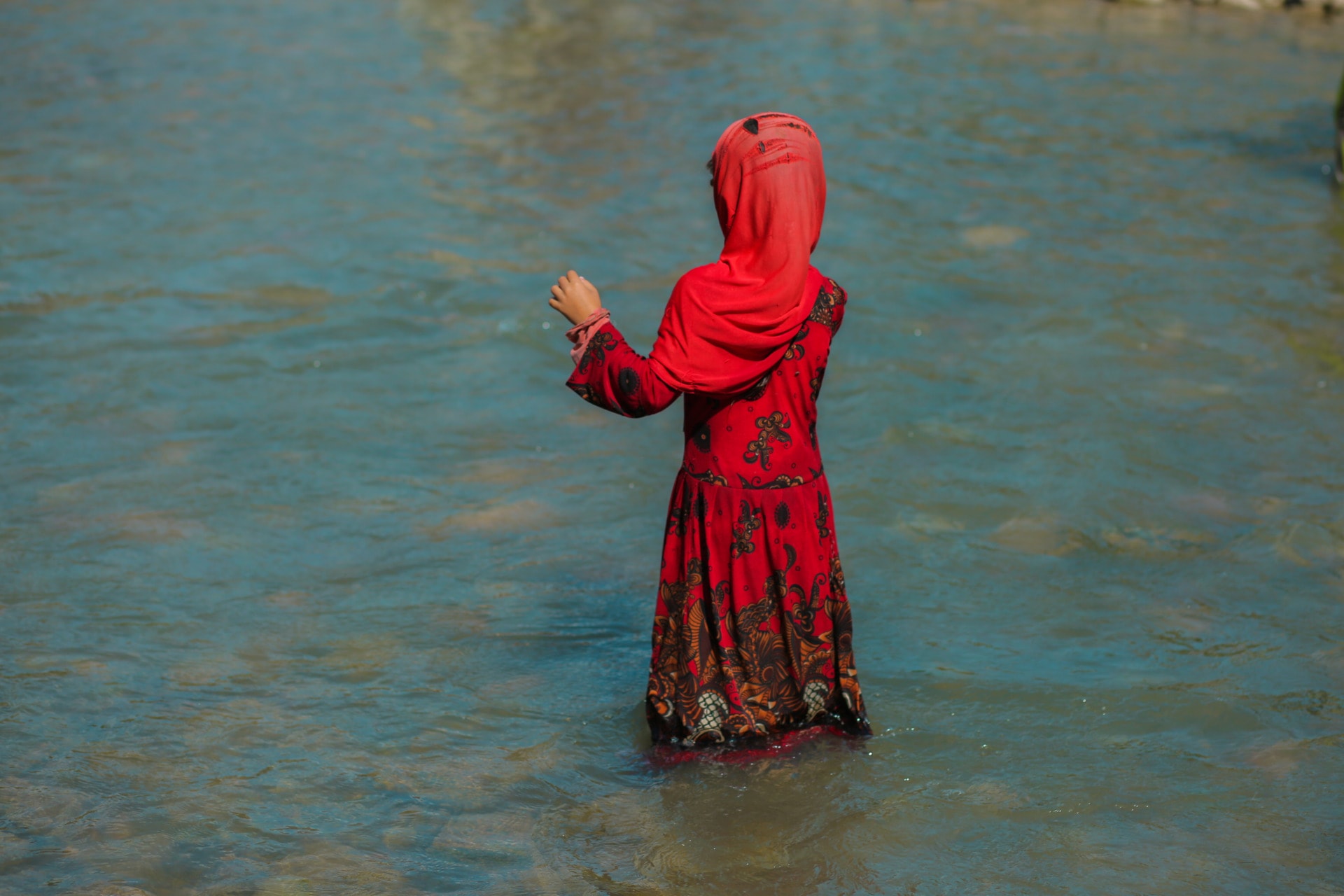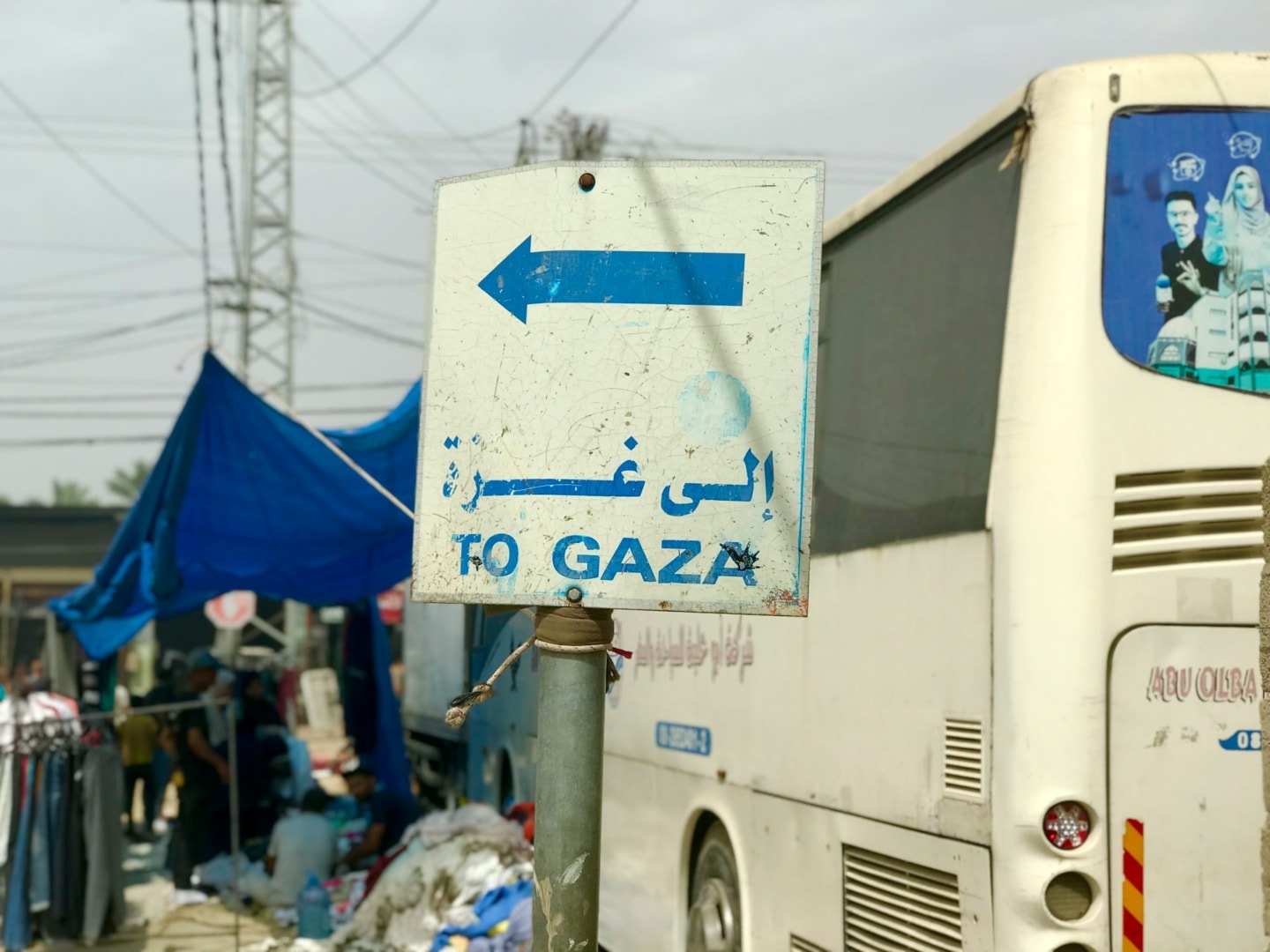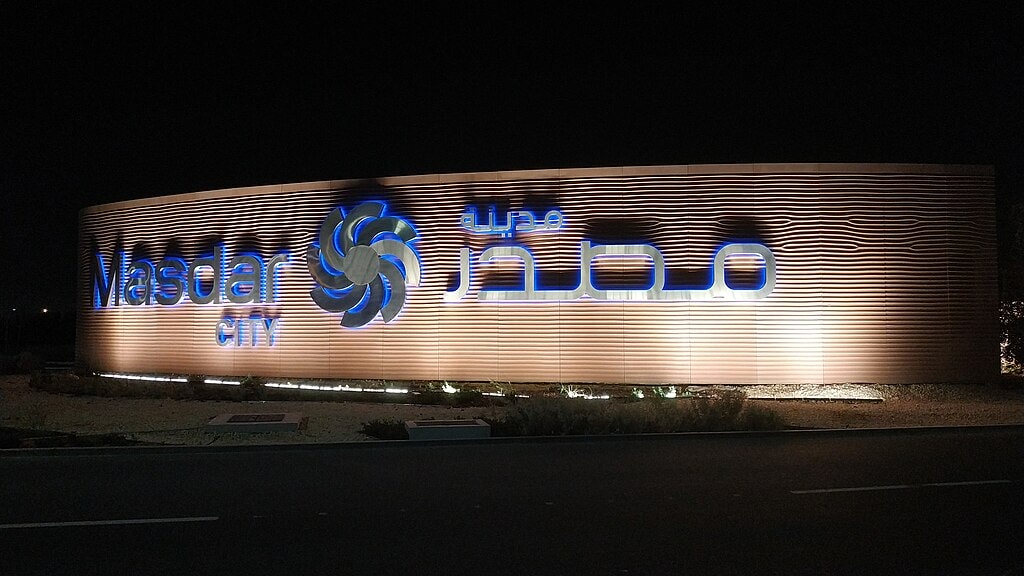“We heard children singing ISIL songs, and saw them role play executions in an Internally Displaced Persons (IDP) camp playground. We were distributing humanitarian aid. It was then that I realized, if we don’t do anything about this … a new, more extremist generation will be born,” Ziena, 27 years old.
Ziena graduated from one of six youth-training workshops hosted by UNDP Iraq partner, Iraqi Al-Amal Association, in 2018. Focused on preventing violent extremism (PVE) and conflict transformation, Ziena is one of 146 university students and youth activists who have been supported to carry out creative community-based activities in their universities and local communities.
Struck by her own experience in an IDP Camp, Ziena created a children’s songbook; filled with words of peace and ideas that support a non- discriminative, gender equal, and non-violent future for Iraq. Each page of the book is decorated with the artwork of IDP children, which today, Ziena and her team of volunteers take to IDP camps to share. She hopes that music and song will guide these children toward a culture of peace and a future free from divisive ideologies.

But, whilst her story is heartwarming and her hands are those working to directly mend the hearts of conflict-affected communities, Ziena is addressing just one layer of conflict in Iraq’s peace-building process. She is instrumental in building a bridge between academic ideas and concepts required to frame a new culture of peace in Iraq, and the tangible actions made in her community, where she encounters survivors of conflict every day. Both aspects are necessary, and indeed complimentary, but there is another layer which is critical to ensuring sustainability of peace in Iraq — the structures that enable peace. For this, the active engagement of the government is crucial.
Recognizing the complexity of this task, the UNDP-funded project, “Education for Peace in the Iraqi Higher Education System,” implemented by national NGO Iraqi Al-Amal Association and the UNESCO Chair for Peace Studies at the University of Innsbruck’s Unit for Peace and Conflict Studies, is designed to address all three levels of conflict — grass-roots, middle and high-level — through a combination of community level programming, curriculum development with the Iraqi Universities Consortium for Peace Studies and government engagement through the Ministry of Higher Education & Scientific Research (MOHESR).
Between October 2018 and March 2019, this culminated in the development of the first national Diploma for Peace and Conflict Studies, which will be piloted at the University of Baghdad later this year. Such an endeavor required an in-depth reflection about the potential meanings of peace and the impact of different notions of peace in the Iraqi context.
Defining Peace
UN Sustainable Development Goal 16 (SDG 16) calls for the promotion of peaceful and inclusive societies for sustainable development — providing justice for all and building effective, accountable and inclusive institutions at all levels. In the same vein, on the International Day of Peace 2018, UN Secretary General Antonio Guterres stated, “There is more to achieving peace than laying down our weapons.”
Since wars begin in the minds of men, it is in the minds of men that the defenses of peace must be constructed.
So, what are the potential meanings of peace beyond the absence of war and direct violence? The preamble of the UNESCO constitution provides a helpful reference point: “Since wars begin in the minds of men, it is in the minds of men that the defenses of peace must be constructed.” Such an understanding of peace opens up a possibility to think about the idea of peace beyond a single universal notion that could be applied in all places and all times, regardless of the respective socio-political and cultural circumstances.
Wolfgang Dietrich, UNESCO Chairholder for Peace Studies at the University of Innsbruck, proposed the idea of “many peaces;” a concept that suggests that there are as many interpretations of peace as there are human beings in the world. This perspective provides an alternative avenue to universalist notions of how peace ought to be. By contrast it introduces a human-centered approach that puts people and the diversity of their lived experiences at the center of conflict transformation work. In the Iraqi context, which has long experienced external interventions, this makes the radical shift of agency to Iraqi citizens, who are now considered the central agents for formulating their own understandings of peace.
Conflict and Violence in Iraq
From the first Gulf War and the authoritarian rule of Saddam Hussein, to the 2003 invasion, the subsequent 8-year Iraq war and ISIL’s occupation between 2014-2017, it is no surprise that the scars of war and conflict have marred the economic and social development potential of Iraq, despite its considerable oil resources. In 2017, according to the Institute for Economics and Peace, the economic impact of violence on the global economy was 14.76 trillion US Dollars or the equivalent of 12.4% of the global GDP. Next to Syria and Afghanistan, Iraq is one of three countries most economically affected by violence, with the cost estimated at 51% of the national GDP — compared with a global average of 11%. This phenomenon can be found globally across different conflict-affected countries, each experiencing high economic costs from the large number of deaths and injury occurring due to armed conflict and population displacement.
Even on its surface, the impact of violence in Iraq is clearly devastating and provides a starting point for inquiry on the status quo of peace and conflict. It seems impossible to measure the real impact of violence on human life, and any attempt to do so renders a superficial picture, only touching upon the material aspects of conflict and leaving central aspects such as emotion and trauma out of consideration. In Iraq, against a long and violent backdrop, people appear trapped in cycles of violence, catalyzed by armed conflict and resulting in the failure of sustainable economic growth and the creation of an inclusive society.
Violence is not always direct and overt. Often it is frozen into structures and into cultures of violence. In Iraq, the long-term Kurdish conflict, as well as ethno-political conflicts amongst Sunni and Shiite lines, have all contributed to the evolvement of a socio-political status quo that has left many communities and society at large traumatized and divided. So, how can Iraqi people, who have been subjected to such violent experiences, move toward sustainable economic and social development and nourish a culture of peace?
Beyond Conflict Resolution
If it were the case that families, communities and societies could be fixed like the engine of a broken car, narrowly focusing on the material aspects of conflict might be a sufficient response. However, human relationships are more complex than the mechanistic qualities of an engine and they are not always rational, with messy human traits tied up in our experience, including crucial sexual, emotional, mental and spiritual dimensions that all constitute a part of human existence.
All of these aspects contribute to the tangible costs of conflict, and using short-term solutions alone to address them will only temporarily suppress conflict — with a strong likelihood that it will appear again, somewhere new. This is why, beyond the idea of simple conflict resolution, a more comprehensive approach to conflict transformation needs to put the relationships of people living and surviving in protracted conflicts at the center of a journey toward peaceful communities.
We know from experience that conflict transformation processes require years, decades or even generations, in the case of large-scale violence. The concept of the “200-years present,” first introduced by sociologist Elise Boulding, explains how an experience of violence will continue to resonate in subsequent generations, through the trans-generational dimensions of trauma. Which is why episodes of violence, such as those experienced during ISIL’s occupation of Iraq, will likely affect the relatives of survivors and witnesses for many years to come.

Hence, while immediate interventions for peace are necessary to address the material dimensions of conflict, such as reconstruction, it is equally crucial to consider the mid and long-term processes of relational work through trauma healing and peace education. This is not only much more cost-effective than investing in further securitization and militarization, but it also opens up the possibility for long-term change processes through the education sector, strengthened to provide platforms for peace. Peace education provides a possibility to think about “many peaces” and conflict transformation as a means of addressing personal and collective challenges that remain deeply ingrained in families, communities and societies moved by the experiences of war and violence. It’s an approach that in the spirit of the UNESCO Constitution starts with the human mind as a central resource for defending peace. And, from experience we know that this may not only contribute to the prevention of further outbreaks of direct violence but that it’s actually a means of transforming cultures of violence to cultures of peaces; equipping people with alternative and effective tools to transform their conflicts peacefully, such as dialogue, and mediation.
Peace education can also be used to help people develop their own ways of living and fostering cultures of peace, and to avoid the belief that their reality is directed by external forces. In Iraq there is a widespread belief that violent conflict is merely imposed by foreigners. This sense is built up from the community level and challenges the notion that people were living in peace before foreign intervention. Whilst we can recognise that there are many external factors contributing to instability in Iraq, we also see how this recognition is used as a strategy to avoid personal responsibility and agency, limiting the possibility of addressing conflict from within one’s own context. Avoiding agency frequently occurs as part of a denial phase after trauma. However, the inclusive, and elicitive approaches in peace education can facilitate ownership for Iraqis, enabling them to take forward this type of peace work and enhancing their level of responsibility on foundational issues.
A Catalyst for Change
The development of a national pilot curriculum for a “Diploma of Peace and Conflict Studies” is an intervention that has come after many years of armed conflict. At the beginning of this project, promoting peace education in the Iraqi higher education sector was the goal, but how can you continue academic life in a context marked by war, where lecture halls and libraries have been destroyed or burnt to the ground? And beyond material damage and destruction: How do you continue academic work and life in a meaningful way after experiencing the kind of atrocities that put all meaning of life into question?
Whilst the circumstances in post-ISIL Iraq are in many ways different from the political, cultural and social situation in Europe post-World War II, there are also certain parallels. Most strikingly we see a new-found momentum to establish a foundation of Peace and Conflict Studies as an academic discipline — and a recognition that the neighboring discipline of International Relations, founded after World War I, was largely unsuccessful in finding the answers to prevent genocide and the use of weapons of mass-destruction. This had a direct effect on the development of a broad range of applied conflict transformation methods, which have been of utmost use for transforming conflicts in a non-violent manner, and which, with the right methodologies, may achieve positive results in Iraq too. This consideration was at the heart of the “Education for Peace in the Iraqi Higher Education System” project. But why academia? Because Iraqi academics have collectively demonstrated a desire to actively contribute to national reconciliation, with a strong will to work together to address the questions of peace and conflict transformation through establishing Peace and Conflict Studies as a new discipline in Iraq.
This culminated in the formation of The Iraqi Universities Consortium for Peace Studies, between 2016-2017, with support from Iraqi Al-Amal, UNDP Iraq and Eastern Mennonite University. The Consortium — comprised of academics from the Universities of Baghdad, Tikrit, Anbar, Basra, Karbala, Kufa and Mosul — became a vocal advocate for the development of Peace Studies in a post-conflict Iraq and actively participated in capacity building activities to train academics and in-turn contribute to the development of a context appropriate curriculum.
Editor’s Picks — Related Articles:
 “International Alert: Building a Transnational Peacebuilding Movement”
“International Alert: Building a Transnational Peacebuilding Movement”
“Integrating Peace, Justice and Stronger Institutions”
MOHESR recognised the need to institutionalize peace education, which was encouraging for the Consortium when taking the first steps to address gaps. In May 2018, the Government of Iraq endorsed the development of a Diploma in Peace and Conflict Studies, establishing new research centers and units in universities, as well as deciding to integrate peace education in university educational curricula. In 2019, they officially approved the establishment of the first Iraqi Higher Diploma for Peace and Conflict studies, based on the curriculum developed by Iraqi academics, in partnership with UNDP, Iraqi Al-Amal and the University of Innsbruck.
Representing a theoretical shift toward a more in-depth practical engagement with Peace Studies, and in spite of challenging structural conditions, academics have retained their influential capacities and their passion for knowledge sharing. As “catalysts for change,” they enable a “middle-out” approach to conflict transformation, capitalizing on their role as intermediaries and wide reaching influence that stretches into different levels of society. As key actors in conflict transformation processes, academics are in a position to simultaneously address the country’s top-leadership level and the grassroots levels of society through their active engagement in communities throughout Iraq. This also recognises the key role they play in facilitating Iraq’s post-ISIL peace process because of the strong influence they have on students and community members inside and outside their universities, owing to the high level of respect awarded to them by society.
This multi-level approach is further exemplified by ensuring the participation of key actors such as representatives of MOHESR on the one hand and young activists and members of vulnerable groups on the other. This facilitates a substantive impact on peace and conflict transformation in Iraq from within the education system, with multi-level buy-in and in line with SDG 16 — Peace Justice and Strong Institutions, which is an overarching objective.
A key purpose of UNDP Iraq’s social cohesion and reconciliation interventions is to promote an understanding of the causes, consequences and possible resolutions of conflict on the institutional level and to foster fundamental values such as respect, dignity and equality. This is the reason UNDP Iraq has focused on enabling the fostering of policy dialogues and advocacy for reduced inequality and tensions amongst ethno-religious groups, whilst strengthening social capital by involving key community actors — including academics and MOHESR. Peace Education was, as a result, one of the adapted approaches, rooted in the education system and addressing specific issues of culture, identity and gender.
Recognising that extending these values to the 800,000 currently enrolled Iraqi university students would be ambitious, the “Education for Peace in the Iraqi Higher Education System” project aims to utilise the university framework and personal influence of academics to ensure that at least a basic module for peace education can be taught across academic disciplines, and potentially have a widespread influence over the next generation of Iraqi leaders.
Peace Work Beyond Academia: Bridging the Gap
Institutionalising a theoretical understanding of peace as a foundation for ideological change — and seeking advocacy efforts of influential academics and government officials — are both key efforts. However, wider Iraqi society and particularly vulnerable groups with limited or no access to tertiary education are also a priority of peace work. One group in particular that wears the scars of the ISIL conflict is the youth, including ex-combatants who were radicalized as a consequence of a number of underlying issues, including hate speech and a lack of access to basic services.
In contrast to this, youth activism has played a key role in promoting cultures of peace since the beginning of post-ISIL peace building processes in Iraq, especially in post-conflict areas. Youth are leading community-level change, consequently eliciting social dialogue and opening channels for communication that cross sectarian lines. With nearly half of Iraq’s population less than 21 years old, their networks for outreach are expansive, both with community members at their universities and over social media.

This is why UNDP Iraq, Iraqi Al-Amal and the University of Innsbruck consider it critical to continue building youth capacity and to give them space to take initiative and do community-based activities — both through continued youth-training and formal university education.
Iraqi Al-Amal have been implementing youth-training workshops with UNDP since 2016, focusing on PVE and Conflict Transformation. Participants are taught both the theoretical concepts and practical advocacy and conflict transformation skills, with selected youth also supported to develop and implement small innovative community projects — bringing their ideas for social cohesion at the community level to life. The story of Ziena was just one example. In many communities, young people now lead regular sports, music and theatre groups or have created communal spaces for individuals to engage and exchange ideas — like community gardens or small libraries.
This approach to working across the three levels of conflict ensures that it is highly inclusive and promotes cultures of peace across all Iraqi communities, including multi-faith, multi-ethnic and multicultural — and for the benefit of both women and men. This sense of inclusion increases ownership, and makes people believe that they can build peace and that it’s a collective responsibility to do so.
Peace Education in 2019
UNDP’s Iraqi Crisis Response and Resilience Programme — under which, with the support of the Government of Japan, the Diploma for Peace and Conflict Studies was developed — rests on the idea of “build back better.” This approach uses the opportunity of restoration and recovery to shape a sustainable environment and equip communities to better manage future crises. It’s holistic, integrated and community driven, addressing the key areas of government coordination and crisis response, basic services, livelihood recovery and social cohesion.

As a key pillar of the peace building process, the Diploma for Peace and Conflict Studies is being launched at a critical juncture. As the rebuilding process continues — both physically and in the mind — Peace Education is enabling the collective ownership of yesterday, the collective effort of today, and the collective peaces of tomorrow.
In this phase of the project the focus will be on building the individual capacities of Iraqi teaching staff for the new Diploma, and institutional capacities on Arabic literature in this field; with the overarching goal of the project to ensure that sustainable cultures of peace can be established and that the path toward achieving SDG 16 can become a little shorter for this post-conflict nation.
Only through recognising and addressing the many experiences of individuals at all levels of society can a pluralistic culture of peace be established and sustainable economic and social development be achieved.
Learn more about UNDP in Iraq at http://www.iq.undp.org/

The University of Innsbruck
The University of Innsbruck’s UNESCO Chair for Peace Studies has developed academic programs in a number of countries. However, against the epistemological insight that peaces are to be understood in the plural and that there are as many interpretations of peace as there are lived experiences in the world, a number of core working principles have been identified as central for facilitating such processes, which have also been central for the Unit for Peace and Conflict Studies: Developing Peace Studies is always also relational work. This requires a close look beyond the material episode of conflict as experiences with conflict are brought to the room by the participants. Against this insight it becomes clear that a focus on relationships is key, that collaboration (and not competition) is a crucial quality for developing successful programs and that their profiles need to mirror local knowledge and the broader political context. www.uibk.ac.at/peacestudies

UNDP Iraq
UNDP partners with people at all levels of society to help build nations that can withstand crisis, and drive and sustain the kind of growth that improves the quality of life for everyone. On the ground in more than 170 countries and territories, we offer global perspective and local insight to help empower lives and build resilient nations.
 Iraqi Al-Amal Association
Iraqi Al-Amal Association
Iraqi Al-Amal Association is a non-political, non-sectarian, and woman-led Iraqi NGO, actively engaged in projects and programmes for the benefit and well being of the Iraqi population regardless of race, gender and political or religious affiliation. Al-Amal was established in 1992 in the midst of the horrific conditions prevailing after the Second Gulf War with the aim of providing aid to relieve the suffering of the Iraqi people.
Its programmes aim to combat all forms of violence and discrimination, promote a culture of Peace, Human Rights, Gender Equality, and Tolerance. Al-Amal also works on the question of law reform, along with the rehabilitation of workers in police and judicial fields, with the aim of securing the supremacy of law and justice in the Iraqi society.
















